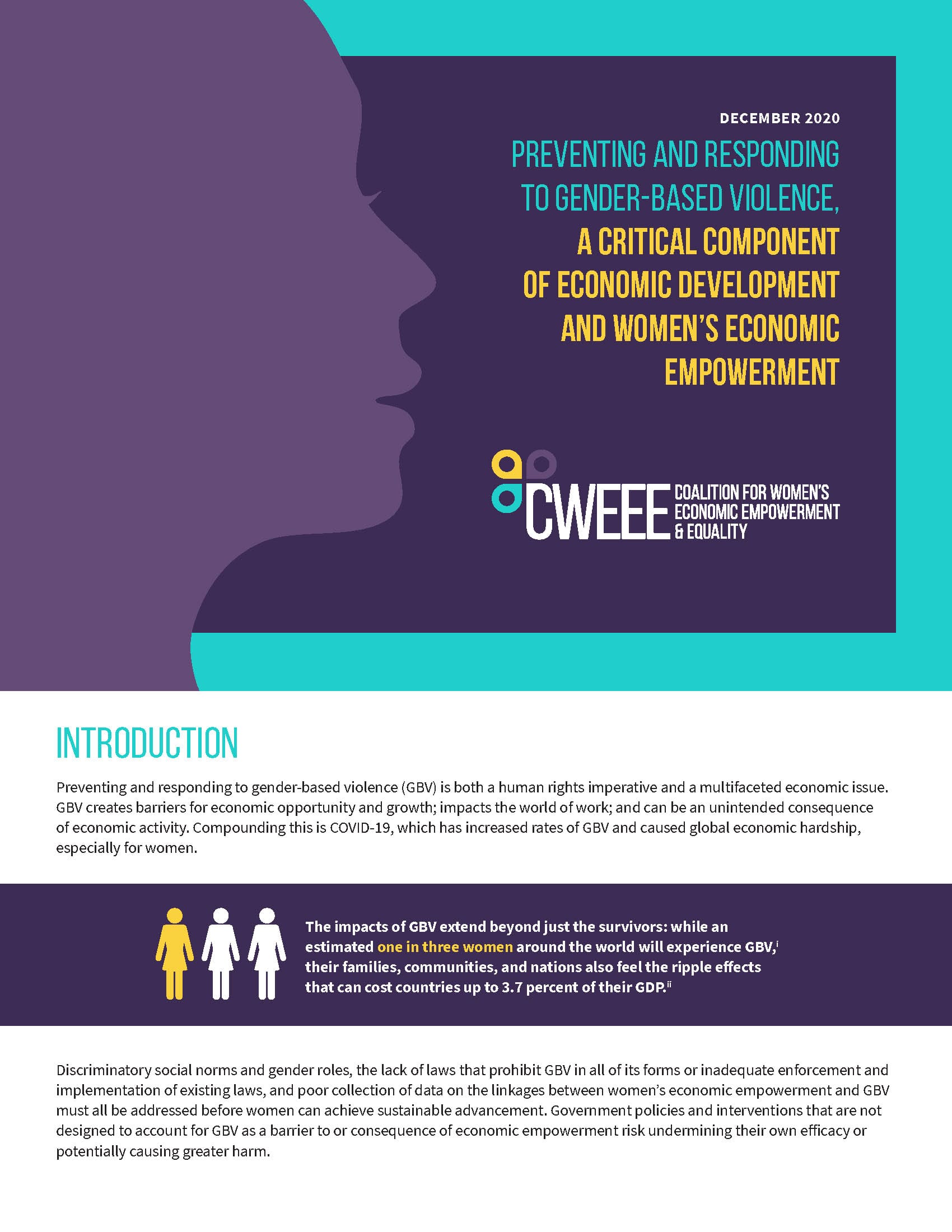
Preventing and Responding to Gender-Based Violence, a Critical Component of Economic Development and Women’s Economic Empowerment
2020
Preventing and responding to gender-based violence (GBV) is both a human rights imperative and a multifaceted economic issue. GBV creates barriers for economic opportunity and growth; impacts the world of work; and can be an unintended consequence of economic activity. Compounding this is COVID-19, which has increased rates of GBV and caused global economic hardship, especially for women.
![]()
 Key Findings
Key Findings
GBV as a Barrier to Women’s Economic Advancement: Acts of GBV such as domestic/intimate partner violence or sexual assault can serve as a barrier to women’s economic empowerment. The physical and psychological impacts of GBV can prevent women from leaving their homes, or using public transportation to get to and from work. They can also disrupt required work functions and productivity, which employers may use to justify dismissal.
GBV in the World of Work: Violence and harassment in the world of work is particularly pernicious, having deep impacts on the targets of the abuse and on employers and industries. Women experiencing sexual harassment may endure physical, psychological and financial harm, which can cause secondary impacts on businesses. In employment, sexual harassment can have serious negative effects on women’s work attendance, retention and ability to advance, as well as women’s long-term earning capacity. Working in the informal economy—92 percent of informal workers are women—further exposes women to GBV in the workplace. The informal sector lacks social and legal protections or formal recourse for GBV in most countries, which makes it difficult for women to prevent violence or access redress measures.
Unintended GBV Consequences of Women’s Economic Empowerment Programs: While employment or entrepreneurship can afford women the financial independence to leave abusive relationships or prevent GBV, some economic empowerment programs may potentially increase GBV. Due to discriminatory social norms that regard men as primary breadwinners, male family members may aim to reassert control by using violence against women who achieve economic success or become more active in economic activity outside of the home.
![]()
U.S. Policy Recommendations
- Ensure that U.S. efforts to advance women’s economic empowerment globally incorporate measures to address GBV as a key barrier to women’s economic empowerment and a critical component of establishing an enabling environment. This should include efforts to improve and expand the focus of the current initiative on women’s economic empowerment. This issue is bipartisan and aligns with the bipartisan Women’s Entrepreneurship and Economic Empowerment Act of 2018 (Public Law 115-428).
- The United States should join the Economic Justice Action Coalition for the Generation Equality Forum and should make commitments on addressing GBV as a barrier to women’s economic empowerment, in the world of work, and as an unintended consequence.
- Given U.S. support for International Labor Organization Convention 190, incorporate core tenets into trade and international assistance programming, strategies, policies and action plans, including U.S. investments through International Financial Institutions, the U.S. International Development Finance Corporation, and activities supported by the Department of Commerce and U.S. Trade Representative.
- Conduct and integrate an intersectional gender analysis and address GBV in all U.S. Government programs and policies, including COVID response and economic recovery plans.
Download the full report by clicking the button below. Learn more about the Coalition for Women’s Economic Empowerment & Equality here.
